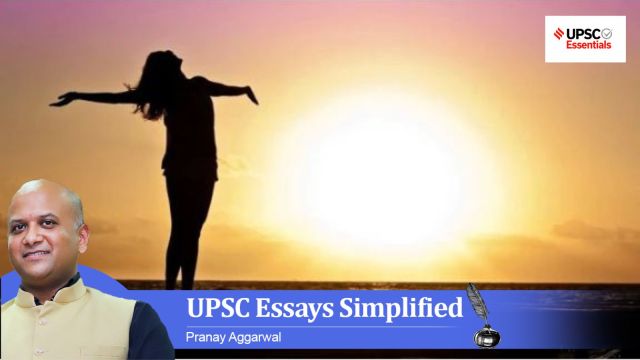On happiness, UPSC asked, “There is no path to happiness; happiness is the path,” a question in the 2024 UPSC Civil Services Exam. Does it suggest that the ideal of happiness — constant joy devoid of pain — is an illusion? Or, as Alfred Nobel believed, is real wealth found in contentment, with happiness being part of the journey itself?
Now, all said, the real challenges in such questions are writing a long essay on a topic where it’s difficult even to go beyond a paragraph, and secondly, maintaining a balance between imagination and humanity. In UPSC Essentials’ special series ‘UPSC Essays Simplified’, we take you through some of the sample essays written by our expert Pranay Aggarwal covering questions of past years.
There is No Path to Happiness; Happiness is the Path
By Pranay Aggarwal
We often treat happiness as a prize waiting at the finish line – a better job, a bigger house, or a dream vacation. But what if happiness isn’t the destination at all? What if it’s the road we walk every day?
Chasing Happiness: A Bane of Our Times
In the critically acclaimed American film ‘The Pursuit of Happyness’, lead actor Will Smith, who plays a struggling salesman and intern, is shown finally attaining happiness in the last scene when he is selected for a full-time job.
Story continues below this ad
Even the U.S. Declaration of Independence proclaimed the ‘pursuit of happiness’ as an unalienable right of all men. Modern society equates happiness with career success and material wealth, worthy of pursuit. People are conditioned to believe that good grades lead to a good job, monetary success and, ultimately, happiness.
Yet, cases of burnout and even suicides by seemingly successful, have-it-all kind of people are not uncommon. Clearly, happiness remains elusive for them.
Modern Workplace – Organizations nowadays focus on maximizing productivity. Managements attempt to motivate employees through pay and perks; but end up creating stress and toxicity in the office. Work instead becomes a source of dissatisfaction and even dread for the employees. Marx described work as the species-essence of man. But in modern times, Marx laments that the worker feels himself only outside of work, while at work he feels outside himself.
Retail ‘therapy’ – 24×7 media with its slick advertising convinces us that we can become happy if we buy this or that. We identify ourselves with our possessions. In the modern times, people even go on a shopping spree and purchase ‘comfort’ buys to cure depression. We continuously seek adrenaline rush and sensory pleasures through external stimuli and erroneously equate happiness with momentary pleasures.
Story continues below this ad
The Happiness Industry – In fact, in today’s consumerist world, happiness itself has been commodified. Self-help books, wellness retreats, and motivational seminars lay down a clear path to happiness. However, commercialization of happiness has created unrealistic expectations, making people believe that they are incomplete until they buy a product or follow a prescribed formula. As the Buddha taught us millennia ago, attachment to desires is the root of all suffering. To be truly happy, we need to let go of desire and ego.
Social media creates a sense of FOMO in us, and appearances matter more than ever before. Digital media content and carefully curated personal profiles suggest that other people have ‘perfect’ lives – perfect bodies, relationships, careers and holidays. Consequently, we become increasingly dissatisfied with our own lives; even as we project our own ‘perfect’ selves out there in the digital space for social validation, and foster a sense of FOMO in others. It’s a vicious cycle.
Finding Happiness
Think about the happiest moments in your life. Were they when you achieved something alone, or when you shared laughter, love, and connection with others? Happiness thrives in relationships – with family, friends, or even strangers we meet along the way. People who cultivate deep bonds and contribute to the community experience greater well-being. Little acts of kindness can bring happiness to both the doer and the recipient of it. Clearly, happiness expands when shared with countless others.
At work, those who find meaning in their efforts experience fulfillment irrespective of rewards. In Bhagavad Gita, Shri Krishna advises us to focus on our Karma without attachment to results. Satisfaction lies in action itself rather than its outcome. Artists, scientists, and athletes often experience being in a state of ‘flow’ where the activity itself becomes the source of happiness. Organizations that recognize this foster work-life balance, and enhances both productivity and satisfaction.
Story continues below this ad
Living in harmony with nature also contributes significantly to happiness. Simple joys like watching a sunrise, breathing fresh air, or walking on grass bring immense calm. When we respect and nurture the environment, nature also nurtures us. Sustainable living and minimalism can help us reduce the stress associated with excess.
From ‘Finding Happiness’ to ‘Being Happy’
Do you ever think “I will be really happy when I get that promotion” or “Once I buy that dream house, life will be perfect”? Many of us do. Yet, the moment we reach these set milestones, another goal appears on the horizon. The endless cycle of “I’ll be happy WHEN…” keeps us running, but never arriving. This, in essence, is the hedonic treadmill. This notion suggests that people have a tendency to quickly return to a relatively stable, baseline level of happiness (or sadness) despite positive or negative external events. Thus, seeking happiness outside is futile. Happiness is a state of existence rather than an external pursuit.
Happiness, or more aptly Ananda (Bliss), is an inner state, rather than something acquired. Science also supports the idea that happiness is an approach to life instead of its goal. Studies in positive psychology show that gratitude, optimism, and emotional resilience contribute more to well-being than wealth or success. Practicing gratitude daily – even for small things – shifts our perspective from lack to abundance.
Life presents challenges, in fact, to each and every one of us. Those who can respond constructively to life’s challenges find greater fulfillment. In his powerfully argued book ‘Man’s Search for Meaning’, psychologist Victor Frankl offers that life never ceases to have meaning, even in suffering and death. Based on his first-hand experiences in a Nazi concentration camp, he underlined that one’s psychological responses are shaped not only by the circumstances but also but also from the freedom of choice one always has – even in severe suffering.
Story continues below this ad
Happiness is experienced living in alignment with one’s values and principles. A life with integrity brings inner peace and lasting happiness. In ancient Greece, stoics rightly taught that happiness isn’t about pursuing pleasure or avoiding discomfort. Instead, it stems from aligning one’s actions with virtues of temperance, fortitude, prudence and justice.
Happy Societies, Happy Nations
Happiness is collective, not just an individual state or pursuit. Simply, ethical collective choices lead to a guilt-free and harmonious existence. Bapu’s principle of Sarvodaya suggests that contentment can be achieved by uplifting others, rather than pursuing selfish gains. Governments that prioritize well-being over mere economic growth create happier societies. Bhutan famously measures Gross National Happiness instead of GDP, ensuring that governance focuses on holistic development and social well-being.
In conclusion, happiness is a state of existence, not a goal to be reached. Happiness lies in appreciating the present, finding joy in small things, and leading a life of purpose and connection. Happiness is a conscious choice rather than something dependent on circumstances.

About our Expert: Pranay Aggarwal is an educator and mentor for aspirants preparing for UPSC Civil Services exam. With more than 10 years of experience guiding civil service aspirants, he is acknowledged as an expert on civil service exam preparation, especially on subjects like Social Issues and Sociology. He is the India representative on the Research Committee on Education, Religion and Political Sociology for UNESCO’s International Sociological Association and a committee member of Indian Sociological Society and its committee on social movements. He is also the Convenor of Indian Civil Services Association, a think tank of senior bureaucrats.
Story continues below this ad
Subscribe to our UPSC newsletter and stay updated with the news cues from the past week.
Stay updated with the latest UPSC articles by joining our Telegram channel – Indian Express UPSC Hub, and follow us on Instagram and X.
For your queries and suggestions write at manas.srivastava@indianexpress.com.



































